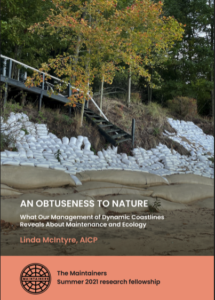“AN OBTUSENESS TO NATURE – What Our Management of Dynamic Coastlines Reveals About Maintenance and Ecology” by Linda McIntyre.
You can download Linda’s report here.
“It would be easy to look at the current state of environmental maintenance and despair. But seizing, and trying to build on, these opportunities offer a way to advance toward a different ethos, one of care and stewardship.”
Summary
Using case studies of three coastal areas -one on the Texas Gulf coast, one on the Great Lakes, one on the Atlantic Ocean- as a lens into the relationship between maintenance and ecology suggests that, at least in these communities, that relationship hasn’t yet absorbed the lessons of history. The big-picture takeaways from these case studies are admittedly discouraging: the institutions that manage coasts seem locked in a futile and expensive doom loop. Yet there is a rational basis for hope since experts in many different fields are developing tools and strategies to calculate the costs of environmental harms and to propose ways to better protect citizens, infrastructure, and ecosystems.
Key Insights
- It’s useful to use comparative analysis to gain a deeper understanding of the topic of maintenance and the environment, as well as the ambivalent and multifaceted consequences that flow from community actions.
- There is no point in trying to come up with a “one size fits all” approach; rather, the three case studies in this study illustrate different scales of geography, population, economic activity, and government. The regions studied have long been subject to the vagaries of weather, water, and human intervention, and they offer some useful lessons for thinking about what “maintenance” and “the environment” mean for coastal communities, and how those meanings inform broader consideration of those subjects.
- The report spells out a number of insights about the state of coastal maintenance and management:
- Even small-scale shoreline armoring is harmful to offsite property and the larger ecosystem and property rights make it hard to regulate.
- Beach nourishment is not a panacea.
- The institutions that manage shorelines are not well-suited to ecological stewardship.
- Poor management is heavily subsidized.
- It also sketches the benefits of a vision of maintenance that places more emphasis on the environment, and asks if coastal maintenance is moving in the right direction in several important areas:
- The US federal government already has acquisition programs for vulnerable property and examples of community relocation.
- Advocates for retreat can (and should) reframe their messaging for more cultural resonance.
- Planning, economics, and other disciplines have useful ideas and contributions waiting for more widespread adoption.
- Environmental politics might not be quite as bad as they appear.
Visit site
Preferred citation:
McIntyre, Linda.
(2022, January 19). AN OBTUSENESS TO NATURE – What Our Management of Dynamic Coastlines Reveals About Maintenance and Ecology. The Maintainers. https://themaintainers.org/an-obtuseness-to-nature/
